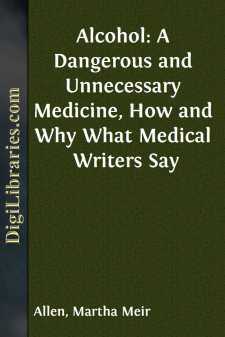Categories
- Antiques & Collectibles 13
- Architecture 36
- Art 48
- Bibles 22
- Biography & Autobiography 813
- Body, Mind & Spirit 142
- Business & Economics 28
- Children's Books 15
- Children's Fiction 12
- Computers 4
- Cooking 94
- Crafts & Hobbies 4
- Drama 346
- Education 46
- Family & Relationships 57
- Fiction 11828
- Games 19
- Gardening 17
- Health & Fitness 34
- History 1377
- House & Home 1
- Humor 147
- Juvenile Fiction 1873
- Juvenile Nonfiction 202
- Language Arts & Disciplines 88
- Law 16
- Literary Collections 686
- Literary Criticism 179
- Mathematics 13
- Medical 41
- Music 40
- Nature 179
- Non-Classifiable 1768
- Performing Arts 7
- Periodicals 1453
- Philosophy 64
- Photography 2
- Poetry 896
- Political Science 203
- Psychology 42
- Reference 154
- Religion 513
- Science 126
- Self-Help 84
- Social Science 81
- Sports & Recreation 34
- Study Aids 3
- Technology & Engineering 59
- Transportation 23
- Travel 463
- True Crime 29
Alcohol: A Dangerous and Unnecessary Medicine, How and Why What Medical Writers Say
Categories:
Description:
Excerpt
INTRODUCTION.
This book is the outcome of many years of study. With the exception of a few quotations, none of the material has ever before appeared in any book. The writer has been indebted for years past to many of the physicians mentioned in the following pages for copies of pamphlets and magazines, and for newspaper articles, bearing upon the medical study of alcohol. Indeed, had it not been for the kindly counsels and hearty co-operation of physicians, she could never have accomplished all that was laid upon her to do as a state and national superintendent of Medical Temperance for the Woman’s Christian Temperance Union. She is also under obligation for helps received from the secretaries of several State Boards of Health, and from eminent chemists and pharmacists.
The object of the book is to put into the hands of the people a statement of the views regarding the medical properties of alcohol held by those physicians who make little, or no use of this drug. In most cases their views are given in their own language, so that the book is, of necessity, largely a compilation.
It is hoped that while the laity may be glad to peruse these pages because of the very useful and interesting information to be obtained from them, the medical profession, also, may be pleased to find, in brief form, the teachings of some of their most distinguished brethren upon a question now frequently up for discussion in society meetings.
The writer does not presume to set forth her own opinions upon a question which is still a subject of dispute among the members of a learned profession; she simply culls from the writings of those members of that profession who, having made thorough examination of the claims of alcohol, have decided that this drug, as ordinarily used, is more harmful than beneficial, and that medical practice would be upon a higher plane, were it driven entirely from the pharmacopœia.
When the first edition of this book was published in 1900, there were only a few leading physicians either in Europe or America who were ready to condemn the medical use of alcohol. Sir Benjamin Ward Richardson, Sims Woodhead, and a few others in England; Forel, Kassowitz and one or two more on the Continent, and Nathan S. Davis, T. D. Crothers and J. H. Kellogg, in America, were about all that could be quoted largely as opposed to alcoholic liquors as remedies in disease. Whisky was then looked upon as necessary in the treatment of consumption and diphtheria. Ten years have brought about a great change. There are many American physicians now willing to admit that they have very little or no use for alcoholic liquors as remedial agents, and now, instead of recommending whisky for consumption anti-tuberculosis literature almost everywhere warns against the use of intoxicating drinks. The use of anti-toxin in diphtheria has driven out whisky treatment in that disease with markedly favorable results. Under the whisky treatment death-rates ran up to fifty-five and sixty per cent.; now the diphtheria death-rate is very low. Ten years ago many good authorities still ranked alcohol as a stimulant; now, almost all rank it as a depressant. In England, leading physicians and surgeons have spoken so strongly against alcohol in the last few years that the London Times, England’s leading newspaper, said: “According to recent developments of scientific opinion, it is not impossible that a belief in the strengthening and supporting qualities of alcohol will eventually become as obsolete as a belief in witchcraft.”
So far as the writer can learn from replies sent to her inquiries by teachers of medicine, and by study of text-books on medicine, and articles in good medical journals, alcohol now has only a very limited use in medicine with the great majority of successful physicians. Some recommend wine in diabetes mellitus, saying that it acts less like a poison and more like a food in that disease than in any other. Some use alcoholic liquors in fevers as a food “to save the burning of tissue,” but an article on “Therapeutics” in the Journal of the American Medical Association, for November 6, 1909, page 1564, says that sugar would probably have equal value in such case....


